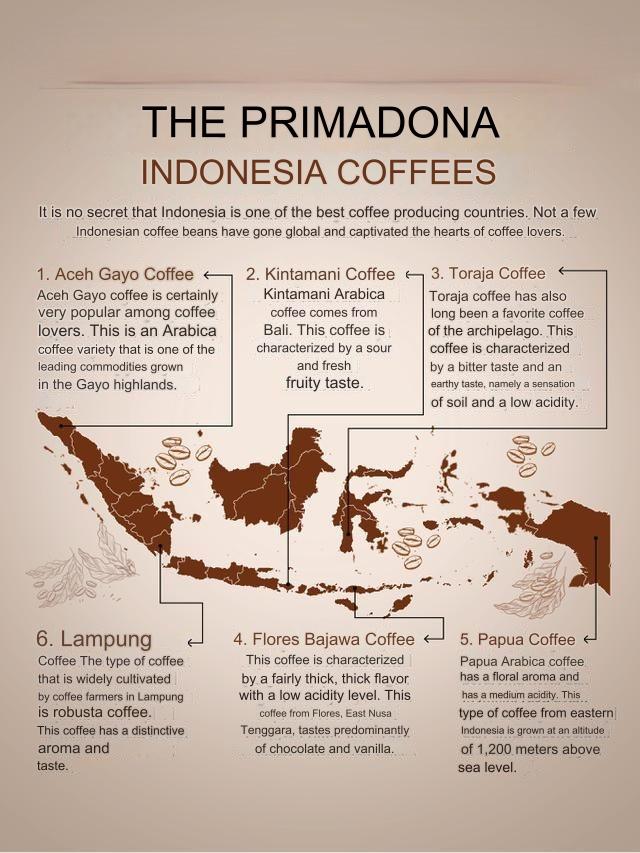
Indonesia is a paradise for coffee enthusiasts. With its unique geography, diverse climates, and rich cultural heritage, the archipelago offers some of the world's most distinctive and flavorful coffees. From high-altitude Arabica plantations to lowland Robusta farms, Indonesia's coffee industry boasts a fascinating history and a promising future.
The Origins of Indonesian Coffee
Coffee was first introduced to Indonesia by Dutch traders in the 17th century. The island of Java became one of the world's earliest coffee cultivation hubs, giving rise to the term "Java" as a synonym for coffee. Today, Indonesia is the fourth-largest coffee producer globally, with its beans prized for their bold flavors and unique processing techniques.
Unique Coffee Regions and Their Profiles
1. Java: The Birthplace of Indonesian Coffee Java is synonymous with Indonesian coffee. The region produces smooth and balanced Arabica beans with nutty and earthy flavors. The semi-washed processing method used in Java enhances these flavor profiles, making the coffee ideal for espresso blends.
2. Sumatra: Complex and Earthy Sumatra is home to some of Indonesia's most famous coffees, including Mandheling and Lintong. These beans are known for their low acidity, full body, and earthy notes, often with hints of chocolate, spice, and tobacco. The wet-hulling (Giling Basah) process gives Sumatran coffee its signature heavy body and unique taste.
3. Bali Kintamani: Fruity and Floral The volcanic soils of Bali Kintamani produce Arabica beans with bright acidity and fruity flavors. Influenced by traditional Balinese farming practices, these coffees often exhibit notes of citrus, brown sugar, and floral undertones.
4. Aceh Gayo: Sweet and Complex Located in northern Sumatra, the Gayo Highlands produce some of Indonesia's best specialty Arabica beans. Known for their sweetness and complex flavor profiles, Gayo coffees often feature herbal, nutty, and floral notes.
5. Sulawesi Toraja: Smooth and Balanced Sulawesi's Toraja region is celebrated for its well-rounded Arabica coffees. These beans have a medium body, low acidity, and notes of caramel, cocoa, and ripe fruit.
6. Flores and Papua: Exotic and Rare The islands of Flores and Papua produce coffees that are lesser-known but equally captivating. Their beans are characterized by deep, chocolatey flavors, tropical fruitiness, and a hint of spice.
Specialty Coffees of Indonesia
Luwak Coffee (Kopi Luwak) Perhaps Indonesia's most famous (and controversial) coffee is Kopi Luwak. This coffee is made from beans that have been eaten and excreted by civets, a process that purportedly enhances the flavor. While unique, it's important to seek ethically produced Luwak coffee to avoid supporting animal exploitation.
Honey and Semi-Washed Coffees Indonesia is renowned for its innovative processing methods, such as honey and semi-washed processes. These techniques enhance the sweetness and complexity of the beans, making them a favorite among specialty coffee roasters.
Why Indonesian Coffee Stands Out Indonesia's coffee diversity stems from its unique combination of volcanic soils, high altitudes, and tropical climate. Each region brings something special to the table, from bright and fruity to deep and earthy flavor profiles. Additionally, traditional processing methods like wet-hulling add a distinct Indonesian signature to the coffee.
Supporting Local Farmers Indonesia's coffee industry supports millions of smallholder farmers who take great pride in their craft. By choosing Indonesian coffee, consumers contribute to sustainable farming practices and the livelihoods of these hardworking communities.
Experience Indonesian Coffee Whether you’re sipping a cup of smooth Java, indulging in the fruity notes of Bali Kintamani, or exploring the bold earthiness of Sumatran Mandheling, Indonesian coffee promises an unforgettable journey of flavors. With so many unique regions and profiles to explore, every cup tells a story of Indonesia’s rich heritage and natural beauty.
So, the next time you brew your coffee, consider reaching for beans from Indonesia—you might just discover your new favorite blend!